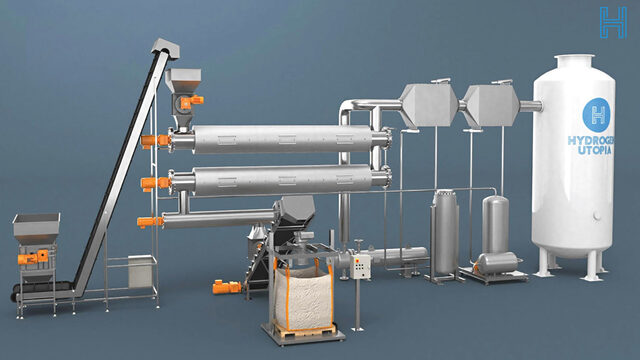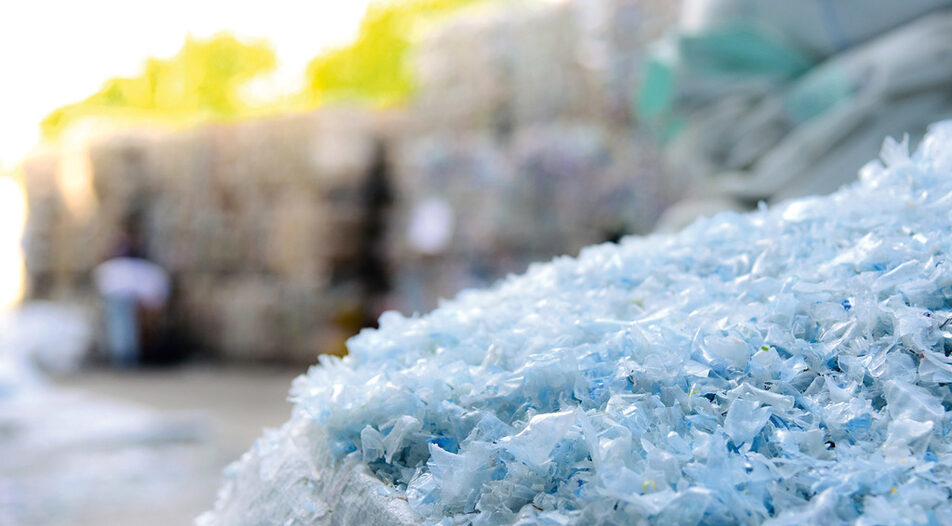The small mountain town of Simitli may become the first place in Bulgaria to have an installation that turns plastic waste into energy. Such a letter of intent was signed a few months ago between mayor Apostol Apostolov and Britain's Hydrogen Utopia International (HUI). The technology itself is new - the first such facility is expected to be built in Poland by this year's end.
In short, it converts plastics into synthetic gas, which in turn can be used for production of electricity, heat and even hydrogen. Such a project costs some 25 million euro and the potential investment will be made by HUI.
How it works?
The solution - called Distributed Modular Gasification (DMG) - is proprietary technology of Britain's Powerhouse Energy. The technology will be at the center of the first UK Plastic Park in Cheshire, which is expected to become operational in 2023. According to an agreement signed last fall, HUI is licensed to use the technology in Europe and Powerhouse Energy keeps the rights for the UK market. However, HUI has additionally developed the design with help from engineering partners like Linde, Electron and SWECO. That makes the facilities more flexible and allows them to produce a wider range of products.
Under the technology, waste plastic is subject to a thermochemical process (pyrolysis) and converted into synthetic gas (syngas), which is a mixture of methane, hydrogen, carbon monoxide and carbon dioxide. The syngas can replace natural gas in different industrial processes, for instance in cement plants or in metallurgy; it can also be used to produce electricity and hydrogen. Throughout the process, heat is released as a by-product.
The big advantage of the installation is that it can process any type of plastic. That allows it to utilize both non-recyclable and end-of-life plastics without the release of unacceptable harmful emissions into the environment, HUI says.
Powerhouse Energy says on its website that what is left after the process is inert residues, which are typically less than 5% of the starting volume of waste plastics. And they can be reused for other purposes or disposed of safely.
The DMG system is scalable, based on 40 tonnes of plastic feedstock a day. That can be converted into 45 tonnes of syngas (the difference comes from the water added during the process), which in turn can produce either 85 megawatt hours of electricity or a combination of 50 megawatt hours of electricity and some 3 tonnes of road fuel quality hydrogen (99.999% purity).
Why Simitli?
The contact with the municipal authorities of the southwestern town was established by HUI as part of its efforts to examine different markets"Simitli is a new adventure. It was the first Bulgarian town that our consultants identified as a possible location - because of its connection with coal, which will have to be replaced with clean energy," HUI CEO Aleksandra Binkowska told the Capital. She explained that if a final decision is taken to proceed with the project, it will serve to demonstrate the possibilities of the technology, which may then be applied at a larger scale - for instance in the region of Stara Zagora, where Bulgaria's largest coal-fired power plants are located.
In Simitli, the possible future DMG plant will be sited close to the town's existing waste remediation facilities. The municipality has pledged to enable HUI to source and purchase a suitable plot for its operations and provide it with assistance regarding the procurement of the necessary permits and approvals, in full compliance with all applicable legislation, the company said in a press release.
As for the plastic feedstock, HUI will rely mainly on sorted waste collection companies.

"If we have to sort the waste manually, that will be part of our project," Binkowska said. "In the ideal case, the waste will be supplied from Bulgaria, because it is a problem in all countries. Our major goal is to utilize waste plastic in an environmentally friendly manner but the technology allows us to produce green fuel from it too," she added.
The system is flexible and hydrogen may be produced only if there is consumption - for trucks and buses for example. "We are not going to store hydrogen, the installation will be adjusted depending on the demand for the day," Binkowska explained.
HUI's most advanced project is in the Polish city of Konin, where the company has already purchased a plot and the environmental impact assessment procedure is under way. The installation there is expected to become operational in late 2022.
Investment
For the implementation of the projects, the company will rely on a combination of own and borrowed funds, as well as on financing under the European Just Transition program and government subsidies. The possible investment in Simitli will be made through a locally registered subsidiary - the way HUI works in other countries. HUI will provide half of the financing and hopes to get the remaining half as European funding. In Binkowska's words, other investors and stakeholders may join in at a later stage.
In Konin for instance, the planned facility will consist of 10 modules and the investment is estimated at some 250 million euro. The company expects to receive 60 million euro from the Just Transition Fund and as much from the Polish government. The remainder will be financed by HUI, private partners and loans. Binkowska said that the local municipality is also a partner in the project - it will buy heat and hydrogen from the installation.
The company expects to generate revenues from the waste processing fees that will be paid by the supplier companies. Another source of revenue will be the sale of energy - syngas, electricity and heat. An analysis prepared by Progressive Equity Research evaluates the return on investment at between 8.8% and 12.3% depending on the scale of the project.
The young investor
Hydrogen Utopia International (HUI) was set up in the United Kingdom in October 2020 by Aleksandra Binkowska and four investors. The company already has subsidiaries in Poland and Greece. Binkowska is an entrepreneur and environmentalist. She also founded the NGO Plastic Neutrality Pledge in February 2021. She has experience in areas like transport, tourism, media and the creative industries.Recently HUI made an IPO on the AQSE growth market. As of May 5, 2022 the company's market cap stands at 27.9 million pounds. Binkowska is the main shareholder (42.45%) and all board directors hold a total of 42.99%.
The small mountain town of Simitli may become the first place in Bulgaria to have an installation that turns plastic waste into energy. Such a letter of intent was signed a few months ago between mayor Apostol Apostolov and Britain's Hydrogen Utopia International (HUI). The technology itself is new - the first such facility is expected to be built in Poland by this year's end.












